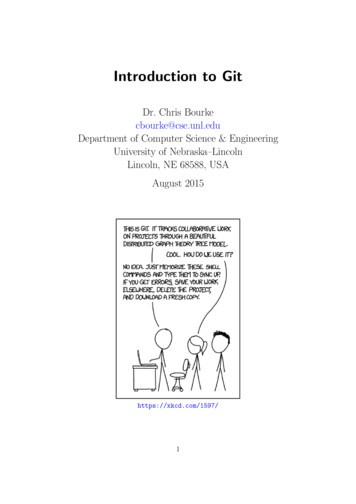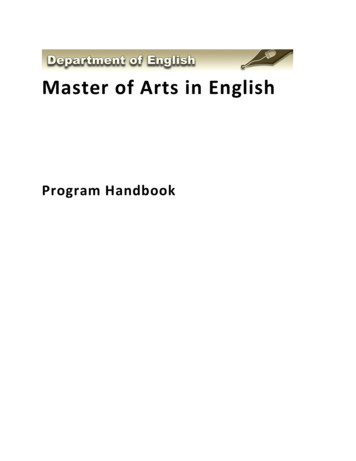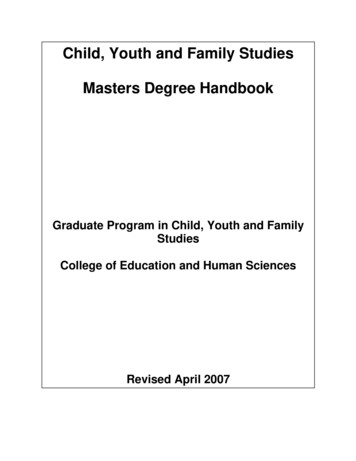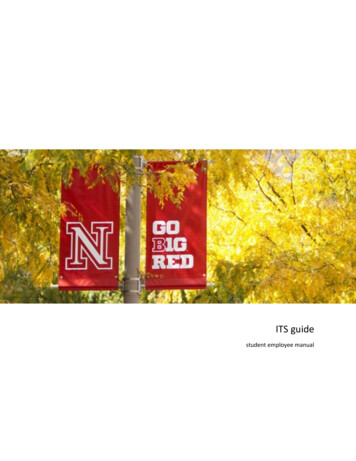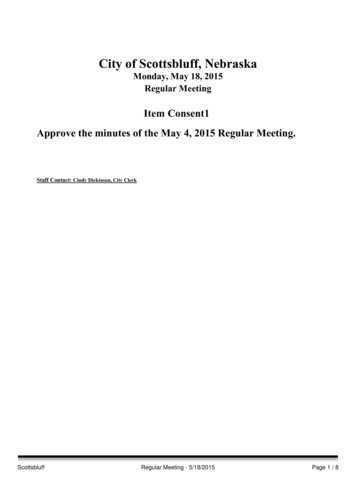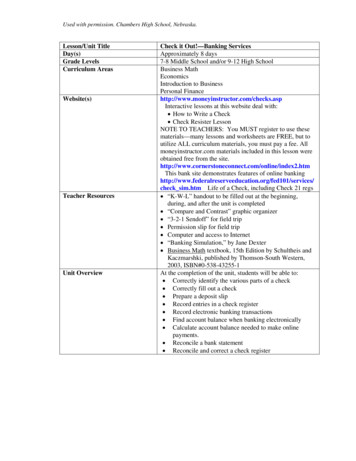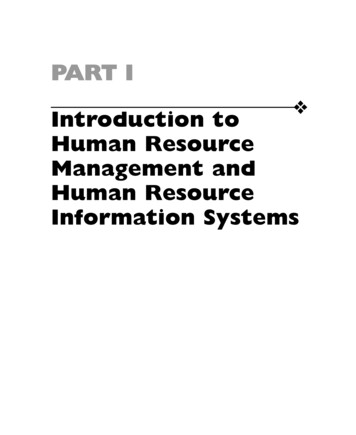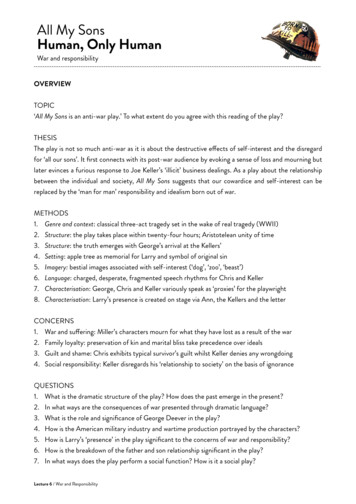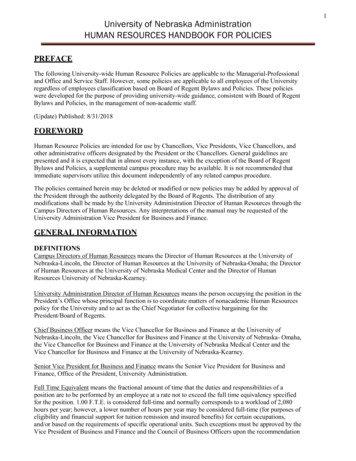
Transcription
University of Nebraska AdministrationHUMAN RESOURCES HANDBOOK FOR POLICIESPREFACEThe following University-wide Human Resource Policies are applicable to the Managerial-Professionaland Office and Service Staff. However, some policies are applicable to all employees of the Universityregardless of employees classification based on Board of Regent Bylaws and Policies. These policieswere developed for the purpose of providing university-wide guidance, consistent with Board of RegentBylaws and Policies, in the management of non-academic staff.(Update) Published: 8/31/2018FOREWORDHuman Resource Policies are intended for use by Chancellors, Vice Presidents, Vice Chancellors, andother administrative officers designated by the President or the Chancellors. General guidelines arepresented and it is expected that in almost every instance, with the exception of the Board of RegentBylaws and Policies, a supplemental campus procedure may be available. It is not recommended thatimmediate supervisors utilize this document independently of any related campus procedure.The policies contained herein may be deleted or modified or new policies may be added by approval ofthe President through the authority delegated by the Board of Regents. The distribution of anymodifications shall be made by the University Administration Director of Human Resources through theCampus Directors of Human Resources. Any interpretations of the manual may be requested of theUniversity Administration Vice President for Business and Finance.GENERAL INFORMATIONDEFINITIONSCampus Directors of Human Resources means the Director of Human Resources at the University ofNebraska-Lincoln, the Director of Human Resources at the University of Nebraska-Omaha; the Directorof Human Resources at the University of Nebraska Medical Center and the Director of HumanResources University of Nebraska-Kearney.University Administration Director of Human Resources means the person occupying the position in thePresident’s Office whose principal function is to coordinate matters of nonacademic Human Resourcespolicy for the University and to act as the Chief Negotiator for collective bargaining for thePresident/Board of Regents.Chief Business Officer means the Vice Chancellor for Business and Finance at the University ofNebraska-Lincoln, the Vice Chancellor for Business and Finance at the University of Nebraska- Omaha,the Vice Chancellor for Business and Finance at the University of Nebraska Medical Center and theVice Chancellor for Business and Finance at the University of Nebraska-Kearney.Senior Vice President for Business and Finance means the Senior Vice President for Business andFinance, Office of the President, University Administration.Full Time Equivalent means the fractional amount of time that the duties and responsibilities of aposition are to be performed by an employee at a rate not to exceed the full time equivalency specifiedfor the position. 1.00 F.T.E. is considered full-time and normally corresponds to a workload of 2,080hours per year; however, a lower number of hours per year may be considered full-time (for purposes ofeligibility and financial support for tuition remission and insured benefits) for certain occupations,and/or based on the requirements of specific operational units. Such exceptions must be approved by theVice President of Business and Finance and the Council of Business Officers upon the recommendation1
University of Nebraska AdministrationHUMAN RESOURCES HANDBOOK FOR POLICIESof University Administration and Campus Human Resource Directors.Major Administrative Unit means the University of Nebraska-Lincoln, the University of NebraskaOmaha, the University of Nebraska Medical Center, and the University of Nebraska at Kearney or theUniversity of Nebraska Administration.Regular Position means a position which is normally expected to continue on an on-going basis.Service Date means the date that is the reference in computing the employee’s eligibility for vacationleave, sick leave, and other benefits that are granted as terms and conditions of employment. Normally,the service date shall be the same as the hiring date of the employee. It shall be adjusted for breaks inservice.Temporary Positions means a position established for a limited period of time to accomplish a specifictask. A temporary appointment typically does not exceed a two year period.Work Day normally means the day upon which work is expected to be performed. There are normally260 work days scheduled per calendar year.Work Week means seven consecutive days or one hundred sixty-eight (168) consecutive hours which isfor the purpose of establishing the uniform schedule of work in the University.EMPLOYMENTAFFIRMATIVE ACTION APPOINTMENTS1.0The Board delegates authority for appointment of other professional staff and the office and servicestaff to the President or the Chancellors or their authorized representatives, as appropriate.2.0Appointments to all managerial-professional positions shall be “special appointments”.3.0All offers of employment for Special Appointments shall be in writing and signed by therespective President, Chancellor, or authorized representative. Written documents shall beprovided to the appointee specifying: if the appointment is a “special appointment” as defined by BOR Bylaw 4.4.1 ,that the appointment is to a regular or temporary position which shall be worked on a fulltime or part-time basis.the duties and responsibilities of the appointee.the appointee's compensation, fringe benefits, and, where applicable, the termination date ofthe appointment.and that the appointment is based on the mutual consent of both parties subject to“employment-at-will” provisions of the State of Nebraska4.0Appointments shall be made to either regular or temporary positions.5.0Appointments made to regular or temporary positions shall be on a full-time or part-time basis.Full-time appointments shall require the appointee to be scheduled to work at least 2,080 hoursper year. Part-time appointments shall require the appointee to be scheduled to work a specifiedamount of time that is at a rate less than 2,080 hours per year.6.0For the special purpose of determining eligibility to participate in the University-wide insuredbenefits program, an appointee shall be appointed to work for a period of at least six (6)consecutive months at a rate greater than or equal to 0.5 full-time equivalent.2
University of Nebraska AdministrationHUMAN RESOURCES HANDBOOK FOR POLICIESCERTIFICATION OF APPLICANT INFORMATION1.0The University of Nebraska shall apply the following standards to applicants for University ofNebraska employment.1.1Applicants for University of Nebraska employment will be required to certify the informationreflected in their application to be true to the best of their knowledge and belief. Anymisrepresentation by an applicant/ employee may result in revocation of a University job offerordischarge, if hired, regardless of when discovered. In the case of an on-line application, a checkbox serves as an electronic signature and evidence of certification.2.0Notice of changes2.1Applicants will be required to acknowledge that they will report to the University HR Office (inwriting) any occurrences or events taking place after their application with the University, whichmay render inaccurate, untrue, or incomplete any statement made in their application.3.0Employment at Will3.1Unless otherwise expressly stated in a written appointment to a position or in a written contractof employment duly approved and executed by the University, all non-faculty employees areconsidered employees at will, and either the University or the employee may terminate theemployment relationship upon giving the proper advance notice.4.0Permission to investigate information4.1In the certification process, an applicant also grants permission to the University of Nebraska toinvestigate employment records, educational records, criminal records, and other records toverify the information provided in their application. The application process requires eachapplicant to release the University, its agents and persons contacted from any liability resultingfrom such investigation.CRIMINAL HISTORY/ BACKGROUND CHECKS (APPLICANT DISCLOSURE)1.0The University of Nebraska shall apply the following standards to applications for University ofNebraska employment.1.1Applicants selected as finalists must disclose if they have been convicted of or have plead guiltyto a felony, or a misdemeanor; or if they are subject to a court order restraining them fromcontacting, harassing, stalking, or threatening another person or child of such other person orengaging in other conduct that would place another person in reasonable fear of bodily injury.1.2Some positions, due to the nature of the job responsibilities, may require the disclosure ofadditional information relevant to the job duties of the position; however, such requirements willbe handled on a job by job basis.2.0Required information2.1For situations in which a criminal history is disclosed, the applicant will be required to identifythe date of conviction or order, type of conviction or order, and jurisdiction where the convictionor order occurred.3.0Terminology3
University of Nebraska AdministrationHUMAN RESOURCES HANDBOOK FOR POLICIES3.1Convicted means a finding of guilt of a criminal offense either as a result of a criminal trial,acceptance of a plea of guilty or no contest (nolo contrendre). Convictions which have been thesubject of a pardon, annulment, or other equivalent procedure based on innocence, and juvenileadjudications will not be considered for purposes of disqualifying an applicant. Convictions ororders subject to a pending appeal may be considered; additional information about the appealmay be needed in order to complete the evaluation of the application.3.2Felony means a criminal offense punishable by death or imprisonment for more than one year.3.3Misdemeanor means a criminal offense punishable by imprisonment of one year or less, and/ ormonetary fine.3.4Court orders shall apply to orders that are issued after a hearing of which the applicant receivedactual notice, and at which the applicant had the opportunity to participate; and includes afinding that the applicant represents a credible threat to the physical safety of such other personor child; or by its terms explicitly prohibits the use, attempted use, or threatened use of physicalforce against such other person or child that would reasonably be expected to cause bodilyinjury.4.0Exercising Employment Decisions4.1A conviction record is not an automatic bar to employment. The University will determinewhether the information is relevant to the position sought depending on the totality of thecircumstances.4.2Prospective employees who would need to hold an ordinary or commercial driver’s license, orwho are child care workers, etc. may be expected to disclose additional information relevant tothe job duties of the position for which they applied. These additional requirements may bespecified by statute or regulation. See e.g., Neb. Rev. Stat. § 71-1912(1) (Cum. Supp. 2002)(staff and employees of child care providers may be subject to national criminal history recordinformation check).4.3Major administrative units or sub-units may be permitted to adopt more stringent standardssubject to legal review and approval by the Chancellor.4.4This policy does not enumerate criteria for making assessment of an applicant; the goal of thispolicy is to state that the University will require applicant disclosure and authorize the Universityto verify information.EMPLOYMENT CATEGORIES1.0Employees shall be hired into one of the following employment categories such that theappropriate terms and conditions of employment may be determined. The employmentcategories listed below are represented in all NU Values Job Families and are assigned to one ofthe following Job Family Zones: Assistant, Associate, Specialist, or Senior.1.1Managerial-Professional staff shall include all personnel who are employed to perform dutiesand responsibilities that are general in scope and who possess the education, talent, skills,abilities, and professional license/certification such that the positions they occupy are consideredby custom in business, industry, and other institutions of higher education as executive,administrative, or professional in nature. These positions generally fall in the Specialist andSenior Zones for each Job Family.4
University of Nebraska AdministrationHUMAN RESOURCES HANDBOOK FOR POLICIES1.2Office and Service staff shall include all personnel who are employed to perform work that bycustom in business, industry, and other institutions of higher education is managed on an hourlybasis, with such work compensated according to hours worked or earned, including clerical andoffice employees, technical/trades employees, general service workers, and other personnel paidon an hourly basis. These positions generally fall in the Assistant and Associate Zones for eachJob Family.EQUAL EMPLOYMENT OPPORTUNITY1.0The University of Nebraska is an Equal Opportunity employer in accordance with the provisionsof the Civil Rights Act of 1964, as amended by the Civil Rights Act of 1991 and Section 503 ofthe Rehabilitation Act of 1973, the Americans with Disabilities Act of 1992, and all executiveorders pertaining to equal opportunity in employment and the Nebraska State Statutes pertainingto employment discrimination.2.0The University forbids discrimination in employment against any applicant or employee on thebasis of race, age 40 and above (with the exception of law enforcement officers who m may berequired to terminate employment at the age of 70) , color, ethnicity, religion, sex, geneticinformation, national origin, sexual orientation, disability, political affiliation, marital orveterans status.3.0The University will take action to ensure applicants are employed and employees are treatedduring employment, without regard to these factors. Merit will be the criterion by whichqualification for appointment, retention, or promotions are judged. Affirmative Action objectiveswill be pursued where Federal programs/funding requires such activities. Realistic labor forcedemographics will be considered for employment decisions.4.0Suspected violations of this policy shall be reported to the Equity and Diversity Office at eachcampus, the Campus Director of Human Resource, or to the University Administration Directorof Human Resources.E-VERIFYU.S. law requires companies to employ only individuals who may legally work in the UnitedStates. E-Verify is an Internet-based system that allows businesses to determine the eligibility oftheir employees to work in the United States. E-Verify is fast, free and easy to use – and it is thebest way employers can ensure a legal workforce. The E-Verify program is jointly administeredby the Department of Homeland Security through the United States Citizenship and ImmigrationServices and the Social Security Administration. E-Verify allows the University to verifyemployment eligibility of newly hired and rehired employees, by checking the informationprovided on their Form I-9 against Social Security and the Department of Homeland Securitydatabases. The University, by requiring new hires and rehires to complete the E-Verify process,complies with the State of Nebraska’s E-Verify legislation outlined in LB 403. Questionsregarding the E-Verify process and requirements should be directed to your campus HumanResource officeREDUCTION IN FORCE1.0A reduction in force is the elimination of staff position(s) and/or the reduction of FTE(s) at theUniversity of Nebraska. A reduction in force may occur because of changing priorities,budgetary constraints, or other operational needs.5
University of Nebraska AdministrationHUMAN RESOURCES HANDBOOK FOR POLICIES1.0.1Termination of employment solely due to poor job performance, misconduct, violation ofUniversity policy, or other similar reason(s) is not considered a reduction in force.1.1Affected employees may be separated from employment because of a general reduction in forceor a reduction in force in any one area.1.2Unless otherwise specified in writing to the employee at the time of employment, employeesbeing separated from employment as part of a reduction in force shall be notified in writing atleast thirty (30) days prior to the date of separation if classified within the Office and Serviceclassification and at least ninety (90) days prior to the date of separation if classified within theManagerial Professional classification.1.3This Reduction in Force policy shall not apply to those employees in probationary periods orthose employees in temporary or on-call positions. Accordingly, such employees are not requiredto receive any notification under this policy.2.0The criteria for determining the order of employees affected by a reduction in force shouldnormally be based on the type of appointment held, quality and length of service, funding source,and other considerations determined by the appointing authority in order to provide for the mostefficient and effective operation of the area affected.3.0Employees shall be eligible for reinstatement and/or reemployment as set forth below.3.0.1“Reinstatement” means that the employee will be placed into the position previously held by theemployee prior to the reduction in force.3.0.2“Reemployment” means that the employee will be placed into a comparable or lower positionwithin the same area as the position previously held prior to the reduction in force.3.1An employee shall be reinstated to the position previously held should such position becomeavailable within six (6) months from the date of separation due to reduction in force.3.2If an employee’s previous position is not available, qualified employees shall be reemployed in acomparable or lower position in the same area, or successor area, should such position(s) becomeavailable within six (6) months from the date of separation due to reduction in force.3.2.1"Comparable position" generally means a position that is similar to the employee’s previousposition in the following ways: requires similar knowledge, skills, and abilities; has similar jobcontent (tasks and responsibilities); and has a similar pay range. Human Resources reserves theright to determine whether a position is comparable under this policy.3.3Employees declining reinstatement to their previous position or reemployment in a comparableposition shall not be eligible for any future position under this policy. Employees decliningreemployment in a lower position shall continue to be eligible for future positions under thispolicy.3.4Employees who do not respond to an offer of employment within five (5) working days willforfeit their rights under this policy.3.5Sections 3.0 to 3.4 of this policy shall not apply to those employees whose job performance isnot at least satisfactory, as determined by Human Resources. In addition, Sections 3.0 to 3.4 of6
University of Nebraska AdministrationHUMAN RESOURCES HANDBOOK FOR POLICIESthis policy shall not apply to employees on grant funded positions or other positions fundedthrough temporary funds.4.0Reduction in Force employees will be considered separated from the University for paypurposes.4.0.1Upon reinstatement, reinstated employees will be paid at the same rate of pay as when they leftUniversity employment and will not be required to serve a new original probationary period.4.0.2Upon reemployment, reemployed employees will be treated as new employees for pay purposesand will be required to serve a new original probationary period.5.0Reductions in force are not grievable.TERMINATION OF EMPLOYMENT1.0Appointment to all managerial-professional positions will terminate in accordance with the timestated in the appointment to the position or in the written contract and, if no time is stated in the
Aug 31, 2018 · Major Administrative Unit means the University of Nebraska-Lincoln, the University of Nebraska- Omaha, the University of Nebraska Medical Center, and the University of Nebraska at Kearney or the University of Nebraska Administration. Regular Position means a position whi
